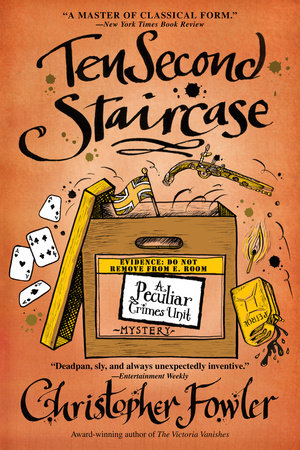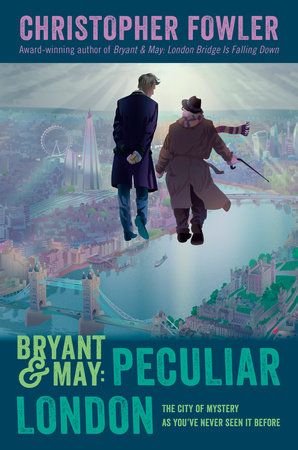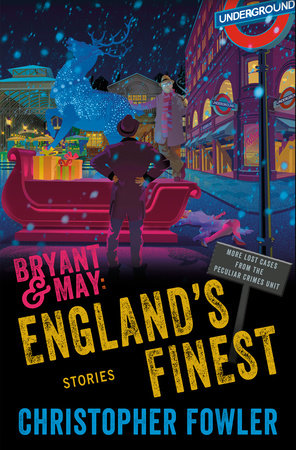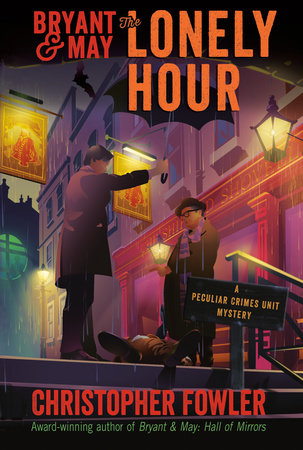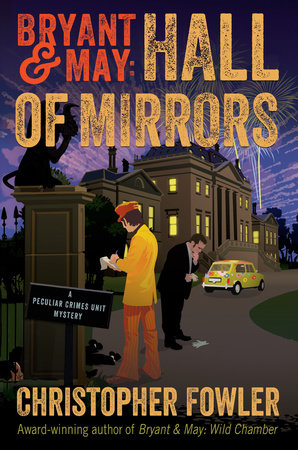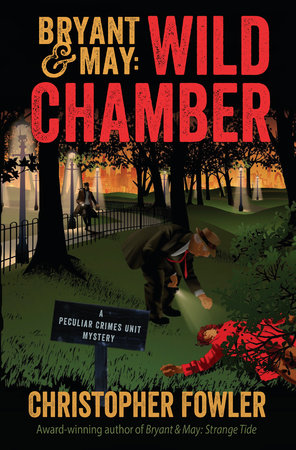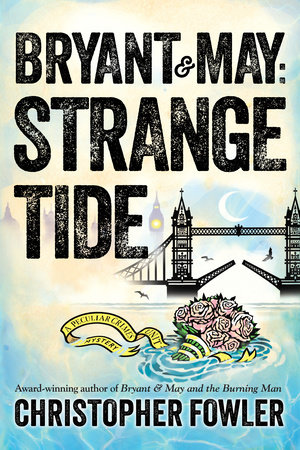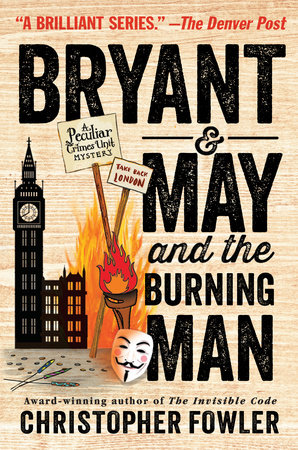Excerpt
Ten Second Staircase
Chapter One
Cradle to GraveMEMORANDUM
PRIVATE AND CONFIDENTIALAttachments Supplied: 3458SD, 19904KT
To: Leslie Faraday, Senior Home Office Liaison Officer
From: Raymond Land, Acting Head, PCU, London NW1 3BL
Date: Monday, 17 October
Dear Mr Faraday,
Thank you for your correspondence of 26 September requesting further details concerning my tenure at the North London Peculiar Crimes Unit.
If I understand you correctly, you wish me to outline the recent problems I have experienced at this unit from a personal perspective. While I am loath to commit myself in writing over such a delicate matter, and dislike 'telling tales' on staff members despite their extreme lack of co-operation over the last few months, I feel the time has come to unburden myself to someone in a position of greater authority. In short, Mr Faraday, I can no longer maintain my silence. I have simply reached the end of my tether.
I appreciate that, as the 'new broom' at HO Special Services Liaison, taking over from HMCO Liaison DCI Stanley Marsden, you must have a great deal of background material to study. I shall therefore attempt to save you some work by summarising our current situation.
The Peculiar Crimes Unit was founded, along with a handful of other specialist departments, soon after the outbreak of World War II, as part of a government initiative to ease the burden on London's overstretched Metropolitan Police Force, by tackling high-profile cases which had the capacity to compound social problems in urban areas. The crimes falling within its remit were often of a politically sensitive nature, or could potentially cause social panics and general public malaise. The division's civilian counterpart at that time was the Central Therapy Unit, set up to help the bereaved and the homeless cope with the psychological stress of war. This unit closed after just eleven months because bombed-out residents continued turning to their neighbours for support rather than visiting qualified specialists. There was also, if memory serves, an experimental propaganda division called the Central Information Service (later to become the COI), which provided positive, uplifting news items to national newspapers in order to combat hearsay and harmful disinformation spread about our overseas forces, and to fill the void left by the blanket news blackouts. The PCU proved more successful than either of these, and remained in operation through the war.
I am led to believe that the title 'peculiar' was originally meant in the sense of 'particular,' as the government's plan was that the new unit should handle those cases deemed uniquely sensitive and a high risk to public morale. To head this division, several extremely young and inexperienced students were recruited. One must remember that this was a time of desperation, when most able-bodied men had been taken into the armed forces, and a great many experimental ideas were proposed by the Churchill government.
A number of successful prosecutions were brought by the Peculiar Crimes Unit in the years that followed, with the result that the unit continued its work into peacetime. The rebuilding of Britain required the suppression of those prosecutions deemed too negative for public knowledge (a fifty-year embargo being placed on sensitive war reports), and many cases handled by the PCU at this time remained
sub judice.
In order to provide continuity, the sons and daughters of original staff members were recruited, so that the founding team was largely replaced with new employees, but two gentlemen remained in their old positions. I refer, of course, to Mr Arthur Bryant and Mr John May (see attached file 3458SD). This is where the problem starts, for both of them, despite their advanced age, are still here at the unit. They stayed on because the unit granted them a high degree of autonomy, and their specialist knowledge, plus their refusal to accept promotion, continuing instead to tackle crime at street level, won them the allegiance of young incoming staff in the Metropolitan Police Force. In years to come, as their supporters moved to positions of power, these loyalties proved useful to the detectives.
I know that the PCU has lately had some success in solving crimes that have come to the attention of the general public. I am also aware that its most senior detectives are highly respected and can offer an enormous amount of experience between them, but their manner is disruptive and their behaviour--certainly in terms of efficient, modern crime management--is unorthodox, and damaging to the image of the national policing network.
Their long-running investigation into the murders of young women committed by the so-called Leicester Square Vampire, last sighted in 1975, brought the PCU into disrepute. Their working practises proved questionable, and the case remains unsolved to this day. The unit's brief is admittedly unusual; their cases rarely provide the opportunity to follow direct leads and name suspects, but their methodology is regarded as altogether too vague, intellectual, socialist, and downright arty by those who work on the 'coal face' of crime, an image the detectives have sought to foster rather than disabuse.
Heaven knows I am no intellectual, but even I can tell that these gentlemen would be better employed as academics than as police officers. Mr May once told me that he could be loosely termed a follower of Jean-Jacques Rousseau, the rational progressive who sometimes placed feeling over reason, but Mr Bryant's philosophical attitude towards criminal investigation is more complex and troubling; although enlightened and well-read, a 'cold fish' who rarely empathises with victims of crime, he is quite prepared to resort to the kind of Counter-Enlightenment mysticism that allows some rationalists to believe in ley lines and crystal healing when it suits them. Simply stated, Mr Bryant and Mr May are completely out of touch with the problems of today's youth. Elderly people rarely commit crimes; how can Mr Bryant and Mr May possibly hope to understand what is happening on the streets of London anymore?
The general public must be able to feel that their lives are in safe hands. As you know, not long ago Mr Bryant accidentally blew up his own unit. Subsequently he managed to get himself shut in a sewer, and nearly died. His partner has had one heart attack, and flagrantly defies doctor's orders to lead a less stressful working life. Nor does Mr May help our image by conducting a very public affair with a married woman. The pair keep irregular hours, behave and dress oddly, and encourage everyone else in their employ to do the same. Detective Sergeant Janice Longbright seems to model herself on Diana Dors, the fifties Rank starlet, and comes to work in the most extraordinarily provocative outfits. I sometimes wonder if we're running a police unit or an escort agency.
Neither Mr Bryant nor Mr May believes in traditional hierarchy. They speak to their colleagues as equals, and frequently ask advice from the most inexperienced members of staff. Obviously, this will not do. Mr Bryant took his exams a very long time ago, and is unwilling to entertain the idea of modern police procedure. He's always touching things; it's only luck that prevents half his cases from being thrown out of court due to cross-contamination of evidence. The criminal world has altered drastically since his time. Even constables are required to pass exams in criminal law, traffic law, and general police duties, but Mr Bryant has somehow been granted immunity from evaluation tests. He has repeatedly refused to take his Objective Structured Performance Related Examination, and deliberately falsifies results from his continuous appraisals.
Of course, the national police force now operates under a regime of openness and transparency, but Mr Bryant prefers to keep his superiors in the dark because, he says, 'it is simpler for them to understand nothing.'
As you know, my own background is in forensic sciences. When I sought promotion to a more senior decision-making role, I was brought into this unit as Acting Temporary Head. As the title implies, I did not expect to remain in the position for more than three months.
That was in 1973. I am still here, still awaiting a transfer.
By the time I joined, the Peculiar Crimes Unit had become very peculiar indeed. It could be likened to a doctors' surgery that had abandoned traditional pharmaceutical treatments for alternative therapies. Over time, these therapies have become more extreme; we have reached a point when it seems quite normal for Mr Bryant to ignore empirical data in favour of hiring a clairvoyant in the search for a missing person. Mr May is not much better; his investigation into pagan elementals a few months ago did result in the capture of a wanted criminal, but he still destroyed a section of the Regent Canal in the process, and the case appears to have involved a mass breakout of illegal immigrants from King's Cross, whom both he and his partner aided and abetted.
The bizarre behaviour of these geriatric detectives seems to infect those working around them, so that I am made to seem the 'odd man out.' I am openly ridiculed and humiliated. Mr Bryant's experiments, conducted without any safety precautions, are both questionable and dangerous. My instructions are disobeyed, my reputation has been irreversibly damaged, and my office wallpaper has been ruined.
Both Mr Bryant and Mr May are beyond statutory retirement age and show no inclination to leave. No-one seems to know quite how old they are, as their files were apparently lost in the fire that destroyed their old offices, but I am reliably informed that Mr Bryant is three years older than his counterpart. Mr May is certainly the more amenable of the pair, possessing a more youthful outlook. He is at least partially familiar with technological advances in the field of crime detection, but Mr Bryant is quite impossible to deal with. In the last eighteen months he has destroyed or lost 17 mobile phones and several laptop computers. How he managed to reprogram the unit's main police transmitter frequency so that it could receive only selections from
The Pirates of Penzance is a mystery we have yet to solve.
Speaking frankly, he is offensive, awkward, argumentative, and unhygienic. He flatly refuses to follow procedural guidelines, and constantly leaves the unit open to legal prosecution. He insists on employing the services of nonprofessionals, including disgraced experts, discredited psychics, registered felons, unstable extremists, tree-huggers, witches, children, itinerants, actors, practitioners of quasi-religions, and various 'creative' types.
Mr Bryant's informants include those on the wrong side of the law, outpatients, migrants, fringe dwellers not recognised as reliable witnesses in a British court of law, and, on at least one occasion, a convicted murderer. He refuses to document his investigations in accordance with official guidelines; his office is little more than a rubbish dump; his personal habits are disgusting and, I suspect, illegal. He smokes and drinks on duty, abuses official property, requisitions police vehicles for personal use, falsifies reports, and is said to have on one occasion borrowed clothes awaiting DNA tests from the Evidence Room in order to attend a fancy dress party. He has an infested Tibetan human skull on his desk, and has been known to keep animal parts in the unit's refrigerator for experiments.
Unfortunately, these transgressions cannot be dealt with through the usual disciplinary channels because, technically speaking, the unit is no longer part of the Metropolitan Police, and now falls under your jurisdiction. However, I am informed (by Mr Bryant himself) that you have no power over staff employed before the revised Official Security Act of 1962.
My work at the unit is personally humiliating. Whenever I attempt to exert some kind of control over him, Mr Bryant plays practical jokes on me. He once convinced me that my wife had taken a French lover, an act which had a disastrous effect on my marriage. Heaven knows, I like a joke as much as the next man, but in this case the next man happened to be my counterpart at the Serete, and did not take kindly to being accused of adultery. In short, Mr Bryant acts as if the serious business of solving crime is some kind of children's game. Lately I have begun to wonder if he has developed some form of senility. Mr May frequently takes his partner's side against me. I know they are laughing behind my back. They practise nepotism, favouritism, and, in Mr Bryant's case, occasional witchcraft. The mother of their detective sergeant was formerly in their employ, and now it appears that Mr May's granddaughter, a girl with a history of psychological problems, is to join the unit. Mr Bryant and Mr May are not just representatives of the law; they are old people, and it is time for them to move on.
Which is why I would like to recommend a psychiatric evaluation report on the pair of them. If their incompetence can be officially proven (something I very much suspect to be the case), then I will finally be able to replace them with younger, more technologically literate unit supervisors. Mr Bryant's and Mr May's consistent refusal of promotion is a ruse that has allowed them to operate 'hands on' as detectives through most of their cases. An evaluation could perhaps recommend they be transferred to positions of part-time consultancy, where they would not come into direct contact with criminal investigations, and would only have powers in a reduced advisory capacity. Mr Bryant refers to himself as a 'cradle-to-grave' law officer; in short, I think it is time he headed for his grave.
For some unearthly reason, both Mr Bryant and Mr May command an almost fanatical loyalty among the rest of the PCU staff. Therefore, I am sure you appreciate the need for absolute discretion in this matter.
I remain,
Yours sincerely,
Raymond Land
Acting Temporary Head of the Peculiar Crimes Unit
(1973--present day)
Chapter Two
Small Provocations
'I hope you're not going to be rude and upset everyone again.'
Detective Sergeant Janice Longbright examined her boss for signs of disarray. She scraped some egg from his creased green tie with a crimson nail, and grudgingly granted her approval.
Arthur Bryant took a deep breath and folded his notes back into his jacket. 'I see nothing wrong with speaking my mind. After all, it is a special occasion.' He fixed his DS with a beady, unforgiving eye. 'I rarely get invited to make speeches. People always think I'm going to be insulting. I've never upset anyone before.'
'Perhaps I could remind you of the mayor's banquet at Mansion House? You told the assembly he had herpes.'
'I said he had a hairpiece. It was a misquote.'
'Well, just remember how overwrought you can get at these events. Did you remember to take your blue pills?' Longbright suspected he had forgotten them because the tablet box was still poking out of his top pocket. 'The doctor warned you it would be easy to muddle them up--'
'I don't need a nurse, thank you. I'll take them afterwards. I haven't quite drifted into senility yet.' Unlike most men, Bryant did not look smarter in a suit. His outfit was several decades out of date and too long in the leg. His shirt collar was far wider than his neck, and the white nimbus of his hair floated up around his prominent ears as though he had been conducting experiments in electricity. Overall, he looked like a soon-to-be-pulped Tussaud's waxwork.


